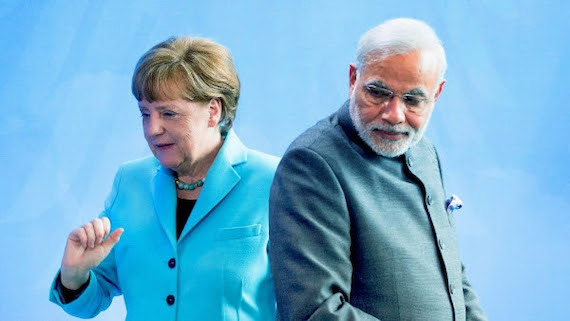
author: Pieter Friedrich*
October 31 was an eventful Halloween in India. German Chancellor Angela Merkel arrived in New Delhi with an entourage of 12 of Germany’s 16 cabinet ministers. On the same day a fact finding report was released on Kashmir: just a day after the touring MEPs expressed support for Modi’s scrapping of Article 370 — which granted Kashmir semi-autonomous status — calling it India’s “internal matter.”
The majority of the two dozen visiting MEPs had hailed from extreme right-wing political parties, including Germany’s neo-Nazi Alternative für Deutschland — a party which will likely soon be headed by Björn Höcke, who has criticized Germany’s Holocaust commemoration policies and declared as his platform: “We want Germany to remain German.”
Facts that EU Delegation May Have Ignored
This other, not much publicised fact-finding team — one composed not of politicians from Europe but of attorneys and human rights activists from India — released a report which starkly contradicted the EU delegation’s conclusions.
Terrorism, concluded this report, has indeed found a foothold in Kashmir. State-sponsored terrorism, that is. Among the facts about the suspension of public transportation, absence of adequate medical care, surveillance of local media, and illegal detentions, one detail stood out. “There are numerous cases of torture by the armed forces. In some instances, the tortures are made audible through loudspeakers so that other people can hear the victim’s screams,” stated the report.
The horrifying allegation that India’s military is psychologically terrorizing Kashmiris by broadcasting the sounds of torture victims was, however, swiftly overshadowed by geo-political developments.
What Merkel Could Have Focused On
Merkel’s talks with Modi could have focused on atrocities in Kashmir. She might also have made mention of the massive detention centers currently being constructed in Assam to house the approximately two million people recently disenfranchised by India’s National Register of Citizens — and how Germany knows, from personal experience, that building concentration camps never ends well.
Maybe she could have also discussed the controversy that arose this summer when Germany’s ambassador to India, Walter Lindner, visited the RSS headquarters in Nagpur to lay flowers at the feet of the paramilitary’s founder, an action that prompted nearly 4,500 people to sign a petition demanding his resignation.
Instead, Merkel’s office announced (as reported by NDTV), “The focus will be economic and trade relations, innovation and digitalization, and climate protection and sustainable development.”
Profits over people took precedence. On November 1, Merkel inked over 20 memorandums of understanding intended to intensify economic relations between Germany and India. No doubt she is blinded by the billions, of which there were over $24 in bilateral trade between the two countries in the last fiscal year.
Merkel’s Disappointing Statement on Kashmir
Aside from economic cooperation, Merkel and Modi shook hands on another major agreement. “We will strengthen bilateral and multilateral cooperation to deal with dangers such as terrorism and extremism,” announced Modi. A joint statement issued by the two leaders pledged to work towards a “stronger international partnership in countering terrorism and preventing violent extremism.”
The state-sponsored terror in Kashmir and the atrocities in the rest of the country in the name of Hindu supremacy apparently do not fall under the purview of their agreement.
Merkel, who certainly understands that actions speak louder than words, offered only the briefest of remarks on Kashmir when probed by German journalists. “The situation now for the people (in Kashmir) is not good and not sustainable,” she said. “This has to be improved for sure.”
Why the situation is not good or who is responsible for it was not something Merkel bothered to address.
How Much is Merkel Willing to Ignore?
Acting as Merkel’s mouthpiece on the eve before her trip, however, Ambassador Lindner more explicitly described Germany’s position on Kashmir. It mirrors that of the far-right EU delegation. “Our position remains that Article 370 is an internal matter for India,” said Lindner.
In the face of massive profits, it seems virtually anything and everything that Modi does will fall under the category of an “internal matter for India.”
Modi’s actions in Kashmir and Assam are not enough to cause her to turn up her nose at him. Nor, indeed, does Merkel appear bothered that RSS (with the BJP as its front) rules India, despite the fact that the fascist paramilitary was founded in 1925 — the same year that Hitler published Mein Kampf, reformulated the Nazi party, and founded the Schutzstaffel — and developed with direct inspiration from the Nazis.
Today, supremacist violence is on the rise in Germany. The victims there are of the same category as the victims in India — minorities (often, but not always, Muslims) and immigrants. Just last month, on October 9, a gunman stormed a German synagogue, killing two people. In June, a neo-Nazi assassinated Walter Luebcke, a member of Merkel’s own party. It marked the first right-wing political murder of a German politician since the end of the Second World War.
Will Merkel Also Embrace the AfD?
Meanwhile, the AfD is overtaking Merkel’s Christian Democratic Union, knocking the CDU into a third-place showing in elections in the state of Thuringia. Höcke, the AfD’s rising star, heads the party’s Thuringia branch. His “Germany for the Germans” platform directly mirrors the platform of the BJP and RSS, who proclaim that India is a Hindu nation.
Notably, white supremacist terrorist Anders Breivik of Norway, who massacred 77 people in 2011, praised the RSS — and its “political arm,” the BJP — for how they “dominate the streets… and often riot and attack Muslims.” Affirming the BJP/RSS agenda to “make the Indian state into a ‘Hindu nation’,” Breivik declared, “It is essential that the European and Indian resistance movements learn from each other and cooperate as much as possible.”
If Merkel isn’t picky about who she works with, as long as they have deep pockets, then one wonders where she will draw the line. Will she also embrace the AfD — or worse — if there’s a chance to put profits over people?
- Pieter Friedrich is a South Asian Affairs Analyst who resides in California. He is the co-author of Captivating the Simple-Hearted: A Struggle for Human Dignity in the Indian Subcontinent. Discover more by him at pieterfriedrich.net.
♦ ALSO READ – TAMIL TRANSLATION OF BOOK ABOUT SIKH STRUGGLE RELEASED

